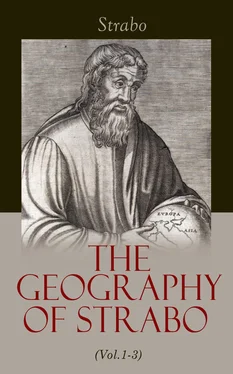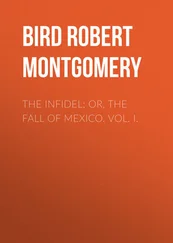Strabo - The Geography of Strabo (Vol.1-3)
Здесь есть возможность читать онлайн «Strabo - The Geography of Strabo (Vol.1-3)» — ознакомительный отрывок электронной книги совершенно бесплатно, а после прочтения отрывка купить полную версию. В некоторых случаях можно слушать аудио, скачать через торрент в формате fb2 и присутствует краткое содержание. Жанр: unrecognised, на английском языке. Описание произведения, (предисловие) а так же отзывы посетителей доступны на портале библиотеки ЛибКат.
- Название:The Geography of Strabo (Vol.1-3)
- Автор:
- Жанр:
- Год:неизвестен
- ISBN:нет данных
- Рейтинг книги:3 / 5. Голосов: 1
-
Избранное:Добавить в избранное
- Отзывы:
-
Ваша оценка:
- 60
- 1
- 2
- 3
- 4
- 5
The Geography of Strabo (Vol.1-3): краткое содержание, описание и аннотация
Предлагаем к чтению аннотацию, описание, краткое содержание или предисловие (зависит от того, что написал сам автор книги «The Geography of Strabo (Vol.1-3)»). Если вы не нашли необходимую информацию о книге — напишите в комментариях, мы постараемся отыскать её.
The Geography of Strabo (Vol.1-3) — читать онлайн ознакомительный отрывок
Ниже представлен текст книги, разбитый по страницам. Система сохранения места последней прочитанной страницы, позволяет с удобством читать онлайн бесплатно книгу «The Geography of Strabo (Vol.1-3)», без необходимости каждый раз заново искать на чём Вы остановились. Поставьте закладку, и сможете в любой момент перейти на страницу, на которой закончили чтение.
Интервал:
Закладка:
5. The men [of the country], being well acquainted with the nature of these places, and that the estuaries would very well answer the same purpose as rivers, founded cities and other settlements along them the same as along rivers. Of this number are Asta, Nebrissa, 1048Onoba, 1049Ossonoba, Mænoba, [Pg 216] [CAS. 143] besides many others. The canals which have been cut in various directions are also found useful in the traffic which is carried on between place and place, both amongst the people themselves and with foreigners. The conflux of water at the flood-tides is also valuable, as rendering navigable the isthmuses which separate the different pieces of water, thus making it possible to ferry over from the rivers into the estuaries, and from the estuaries into the rivers. Their trade is wholly carried on with Italy and Rome. The navigation is excellent as far as the Pillars, (excepting perhaps some little difficulties at the Strait,) and equally so on the Mediterranean, where the voyages are very calm, especially to those who keep the high seas. This is a great advantage to merchant-vessels. The winds on the high seas blow regularly; and peace reigns there now, the pirates having been put down, so that in every respect the voyage is facile. Posidonius tells us he observed the singular phenomenon in his journey from Iberia, 1050that in this sea, as far as the Gulf of Sardinia, the south-east 1051winds blow periodically. And on this account he strove in vain for three whole months to reach Italy, being driven about by the winds against the Gymnesian islands, 1052Sardinia, and the opposite coasts of Libya.
6. Large quantities of corn and wine are exported from Turdetania, besides much oil, which is of the first quality; 1053also wax, honey, pitch, large quantities of the kermes-berry, 1054and vermilion not inferior to that of Sinope. 1055The country furnishes the timber for their ship-building. They have likewise mineral salt, and not a few salt streams. A considerable quantity of salted fish is exported, not only from hence, but also from the remainder of the coast beyond the Pillars, equal to that of Pontus. Formerly they exported large quantities of garments, but they now send the [unmanufactured] wool, which is superior even to that of the Coraxi, 1056and remarkable for its beauty. Rams for the purpose of covering fetch a talent. The stuffs manufactured by the Saltiatæ 1057are of incomparable texture. There is a super-abundance of cattle, and a great variety of game: while, on the other hand, of destructive animals there are scarcely any, with the exception of certain little hares which burrow in the ground, and are called by some leberides. 1058These creatures destroy both seeds and trees by gnawing their roots. They are met with throughout almost the whole of Iberia, 1059and extend to Marseilles, infesting likewise the islands. It is said that formerly the inhabitants of the Gymnesian islands 1060sent a deputation to the Romans soliciting that a new land might be given them, as they were quite driven out of their country by these animals, being no longer able to stand against their vast multitudes. 1061It is possible that people should be obliged to have recourse to such an expedient for help in waging war in so great an extremity, which however but seldom happens, and is a plague produced by some pestilential state of the atmosphere, which at other times has produced serpents and rats in like abundance; but for the ordinary increase of these little hares, many ways of hunting have been devised, amongst others by wild cats from Africa, 1062trained for the purpose. Having muzzled these, they turn them into the holes, when they either drag out the animals they find there with their claws, or compel them to fly to the surface of the earth, where they are taken by people standing by for that purpose. The large amount of the exports from Turdetania is evinced by the size and number of their ships. Merchant-vessels of the greatest size sail thence to Dicæarchia 1063and [Pg 218] [CAS. 145] Ostia, a Roman port; they are in number nearly equal to those which arrive from Libya.
7. Such is the wealth of the inland part of Turdetania, and its maritime portions are found fully to equal it in the richness of their sea-productions. In fact, oysters and every variety of shell-fish, remarkable both for their number and size, are found along the whole of the exterior sea, but here in particular. It is probable that the flow and ebb tides, which are particularly strong here, contribute both to their quantity and size, on account of the great number of pools and standing waters which they form. 1064The same is the case with regard to all kinds of cetacea, narwhals, whales, and physeteri, 1065which when they blow [up the water from their snouts] appear to observers from a distance to resemble a cloud shaped like a column. The congers are quite monstrous, far surpassing in size those of our [sea]; 1066so are the lampreys, and many other fish of the same kind. It is said that in Carteia there are kerukæ 1067and cuttle-fish which would contain as much as ten cotylæ. 1068In the parts more exterior there are lampreys and congers weighing 80 minæ, 1069and polypes a talent, 1070also teuthidæ 1071two cubits in length, with other fish in proportion. Shoals of rich fat thunny are driven hither from the sea-coast beyond. They feed on the fruit of a species of stunted oak, which grows at the bottom of the sea, and produces very large acorns. The same oaks grow in large numbers throughout the land of Iberia, their roots are of the same size as those of the full-grown oak, although the tree itself never attains the height of a low shrub. So great is the quantity of fruit which it produces, that at the season when they are ripe, the whole coast on either side of the Pillars is covered with acorns which have been thrown up by the tides: the quantity however is always less on this side the Pillars [than on the other]. Polybius states that these acorns are ejected [by the sea] as far as [the shores of] Latium, unless, he adds, Sardo 1072and the neighbouring districts also produce them. The thunny-fish become gradually thinner, owing to the failure of their food, as they approach the Pillars from the outer sea. This fish, in fact, may be regarded as a kind of sea-hog, being fond of the acorn, and growing marvellously fat upon it; and whenever acorns are abundant, thunny-fish are abundant likewise.
8. Of the various riches of the aforenamed country, 1073not the least is its wealth in metals: this every one will particularly esteem and admire. Of metals, in fact, the whole country of the Iberians is full, although it is not equally fertile and flourishing throughout, especially in those parts where the metals most abound. It is seldom that any place is blessed with both these advantages, and likewise seldom that the different kinds of metals abound in one small territory. Turdetania, however, and the surrounding districts surpass so entirely in this respect, that however you may wish, words cannot convey their excellence. Gold, silver, copper, and iron, equal in amount and of similar quality, not having been hitherto discovered in any other part of the world. 1074Gold is not only dug from the mines, but likewise collected; sand containing gold being washed down by the rivers and torrents. It is frequently met with in arid districts, but here the gold is not visible to the sight, whereas in those which are overflowed the grains of gold are seen glittering. On this account they cause water to flow over the arid places in order to make the grains shine; they also dig pits, and make use of other contrivances for washing the sand, and separating the gold from it; so that at the present day more gold is procured by washing than by digging it from the mines. The Galatæ affirm that the mines along the Kemmenus mountains 1075and their side of the Pyrenees are superior; but most people prefer those on this side. They say that sometimes amongst the [Pg 220] [CAS. 146] grains of gold lumps have been found weighing half a pound, these they call palæ ; they need but little refining. 1076They also say that in splitting open stones they find small lumps, resembling paps. And that when they have melted the gold, and purified it by means of a kind of aluminous earth, the residue left is electrum . This, which contains a mixture of silver and gold, being again subjected to the fire, the silver is separated and the gold left [pure]; for this metal is easily dissipated and fat, 1077and on this account gold is most easily melted by straw, the flame of which is soft, and bearing a similarity [to the gold], causes it easily to dissolve: whereas coal, besides wasting a great deal, melts it too much by reason of its vehemence, and carries it off [in vapour]. In the beds of the rivers the sand is either collected and washed in boats close by, or else a pit is dug to which the earth is carried and there washed. The furnaces for silver are constructed lofty, in order that the vapour, which is dense and pestilent, may be raised and carried off. Certain of the copper mines are called gold mines, which would seem to show that formerly gold was dug from them.
Читать дальшеИнтервал:
Закладка:
Похожие книги на «The Geography of Strabo (Vol.1-3)»
Представляем Вашему вниманию похожие книги на «The Geography of Strabo (Vol.1-3)» списком для выбора. Мы отобрали схожую по названию и смыслу литературу в надежде предоставить читателям больше вариантов отыскать новые, интересные, ещё непрочитанные произведения.
Обсуждение, отзывы о книге «The Geography of Strabo (Vol.1-3)» и просто собственные мнения читателей. Оставьте ваши комментарии, напишите, что Вы думаете о произведении, его смысле или главных героях. Укажите что конкретно понравилось, а что нет, и почему Вы так считаете.












![Anne Blunt - A Pilgrimage to Nejd, the Cradle of the Arab Race. Vol. 2 [of 2]](/books/750183/anne-blunt-a-pilgrimage-to-nejd-the-cradle-of-the-thumb.webp)